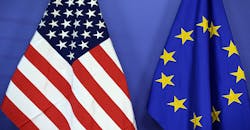WTO Approves EU Tariffs for Aircraft Subsidies
The tariff dispute between the U.S. and European Union reached a new phase with Tuesday's World Trade Organization decision allowing the EU to implement tariffs worth $4 billion on imported U.S. goods. The decision by the WTO appellate panel parallels the clearance given last fall to the U.S., to implement $7.5 billion of tariffs annually on European Union exports to the U.S.
Both cases for tariffs relate to a long dispute over subsidization of Boeing and Airbus in their respective home markets, which the WTO has determined were violations by the U.S. and EU, respectively.
Whether the EU would proceed to impose the tariffs is unclear. Its trade governing body, the European Commission, seems likely to use the threat of tariffs to convince the U.S. to withdraw its tariff program.
Bernd Lange, chairman of the EU Committee on International Trade, stated: "I sincerely hope that this decision will work as an incentive to end these disputes through a negotiated settlement. That should remain the absolute priority because, in times like these, we should, more than ever, work together and not against each other."
Lange called for negotiations to reach a long-term agreement on aircraft subsidies.
Notably, the underlying issue of aircraft subsidies is receding in importance. The Washington State tax break that the WTO ruled as a subsidy to Boeing has now been rescinded; and Airbus has pledged to accelerate loan repayments to France and Spain over the A350 program, loans that the WTO found violated its subsidization regulations.
The U.S. has sought to use tariffs as a tool to force negotiations on a broader trade pact with the EU.
The U.S. Trade Representative has maintained that there is no legal basis for the EU to impose tariffs — because the Washington State tax relief has ended.
USTR Robert Lighthizer said any EU effort to implement penalties on U.S. products would be “plainly contrary to WTO principles and will force a U.S. response.”
